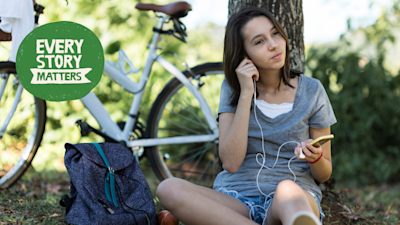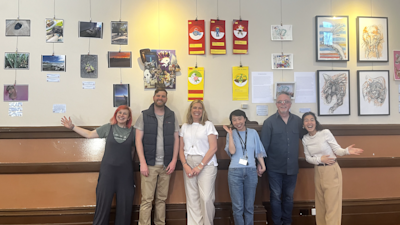"Cooking makes me feel calm and I also find it fun. I find I can now concentrate better and have more energy."

Image: Collage of images: 1. George holding a plate of food, 2. Calamari 3. Greek salad. Text: George cooks up a good life for himself.
George was very close with his mother, and when she sadly passed, George's anxiety and depression worsened. He withdrew from social situations, stopped eating well, and turned to takeout food.
George lives in his family home and the kitchen is still full of his late mum’s appliances and utensils. Food, well his mothers cooking, was once a source of joy and comfort for George. The smell of freshly torn basil reminds him of his mum’s old vegetable and herb garden. The curl of pasta laden with rich sauce reminds him of meals around his family’s dinner table.
“My favourite meal mum used to cook was fresh pasta with lots of sauce and her Greek salad,” said George.
Together with Leigh, his Life Without Barriers Recovery Coach, George set some new goals: to take better care of himself, learn to cook, increase his energy levels and enjoy life again.

Image: George, holding a plate of food and smiling at the camera.
When searching for potential recovery therapies, George and Leigh explored different activities George wanted to do. George said that while he liked to eat a wide variety of different cuisines, he did not feel confident enough to make any of those meals himself. So learning to cook became a goal for George.
Leigh searched for the right program where George could learn one-on-one in his own home, so he could be comfortable in his kitchen. George needed a program where he could work at his own pace, that was flexible and able to consider George’s needs when selecting recipes and cooking techniques.
The Cook Eat Repeat program fit the bill perfectly. Tasks could be completed in George’s own time and repeated as often as required to enhance his retention and match his learning style.
George, with the help of his facilitator, learned to prepare batches of a healthy dish that he could eat across a few meals. George would also perfect simpler meals to eat as well, like eggs on toast.

Image: Collage of images of George preparing food and the dishes he created.
George’s cooking teacher taught him how to prepare, cook, and store food, as well as hygiene and safety practices. At the start, his teacher would plan the meals, provide a shopping list, assist with the meal preparation, and clean the kitchen for George. They started with 20-minute cooking sessions every fortnight, which included something easier to make, like a side dish.
With time, the sessions increased to 30 minutes, and George started to help with cleaning up. On the weeks George did not have lessons, his homework was to cook the dish he learned in the last class on his own.
Next George was to research a recipe of his choice, create his shopping list, purchase the ingredients and then make a meal to share with his facilitator.
A milestone moment was when George cooked a main meal on his own to enjoy that evening and froze the rest to enjoy later.
Outside the cooking classes, George cooked meals and discussed his thoughts on the process, taste, and texture with his facilitator. If there were any difficulties he encountered, George and his facilitator would work on these in their sessions. Over the two-plus years in the program, George has now cooked over 70 recipes.
“My favourite meals I’ve done are Spanish paella, pan-fried fish with lemon and herb butter sauce and Greek salad, and salt and pepper calamari," said George.
"My Greek salad is not as good as Mum’s yet, but it is getting there.”

Image: Collage of images of George holding plates of food and close-ups of the dishes he created.
George slowly mastered his kitchen and continued to develop a repertoire of cooking skills from cutting and dicing to measuring, mixing, dough making, and frying. He now feels safe and confident in the kitchen, knows how to work with heat and sharp tools, and cleans up after preparing meals.
Just like his mum used to, George now stores unused ingredients for future use, minimising waste and saving costs. He is also more aware of his need for healthy dishes and buys less takeaway meals. George now finds the act of cooking therapeutic.
"Cooking makes me feel calm and I also find it fun. I find I can now concentrate better and have more energy."
Leigh and George are now working on expanding his skills and reaching George’s goal of being completely independent in meal preparation. George’s achievements have boosted his confidence to the point that he has requested to have weekly classes.
Leigh is also working to get George a new oven (his current one is not working), so that George can make his own snacks like muffins.
George’s recovery coaching has opened a new door that connects George to a world of food, family, and nostalgia. No longer intimidated by his kitchen, George now uses his electric fry pan, air fryer, and induction cooktop with confidence. He has bought more cooking utensils, cutlery, and crockery and has become quite house-proud.
George has also started cooking for other people, and his sister often comes over to share a meal.
“I like to cook for people. It makes me very happy when people like the food I cook. I’m excited to start my own veggie garden,” said George.
George has bought a few pots and seedlings and is working on starting his own herb garden and vegetable patch, just like the one his mother had.

Image: George's veggie garden.
Recovery coaching is an NDIS-funded support for people with a psychosocial disability. Psychosocial disability is the challenges people with mental health conditions face that affect their ability to participate in life. Recovery coaching helps people maintain their wellness and build their capacity and resilience over time, using recovery-based practices.


